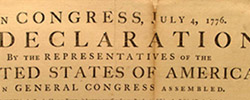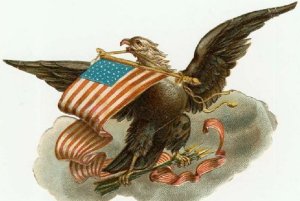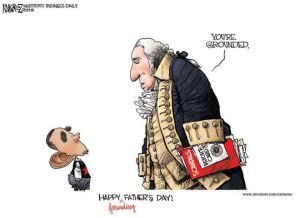
Lincoln’s ten sentences changed America.
It is nearly impossible today to comprehend how Americans viewed their nation and their political institutions before the U.S. Civil War.
American presidents rarely spoke in public – it was considered undignified. God knows what George Washington or Thomas Jefferson would have thought of today’s chief executives attempting to curry the voters’ favor by suffering the indignities of an appearance on The Colbert Report.
Then, we were one nation, quite divisible, with liberty and justice for some. Slavery was a multi-billion-dollar-a-year labor system that made the United States the third-wealthiest country in the world. North and South, a popular view of the federal republic was it existed only as a creature surviving at the whim of the states. The states entered freely, proponents said, and they could leave freely.
In fact, on the eve of the War Between the States to many it seemed the only glue that held us together was the wealth generated by King Cotton and the blood drawn from the backs of slaves.
Yet 150 years ago on November 19, while we were engaged in a great civil war, Abraham Lincoln gave a speech in public that redefined us forever. It became known as the Gettysburg Address, and it is rightly credited for performing the nearly impossible. Invited by the city fathers of Gettysburg, Penn., to offer “a few appropriate remarks” at the dedication of a new cemetery, Mr. Lincoln’s ten sentences not only summarized the meaning of the Civil War but the meaning of America. He called on Americans, then and now, to dedicate themselves to the “unfinished work” of the battle – the vindication of the principle of natural rights and human equality. Few things ever said by any American achieved so much through so few words.
Today, we think of the Gettysburg Address as an assignment for school children or verbal decoration for the marble walls of memorials. The relegation of that powerful speech to such status is as trite as it is unfortunate. It took Lincoln, a man who once said that every political sentiment he possessed sprang from the Declaration of Independence, to remind us that the central ideas of the United States are liberty and freedom. He echoed those concepts in the opening words of the address, saying we are a nation “conceived in liberty.” The “proposition” that all men – the inclusive term for humankind used in the 18th and 19th century – are created equal is a rule of nature, like Isaac Newton’s laws of physics. This was a revolutionary idea, even while the Civil War was being fought, because the Declaration stated that the laws of nature were created by God and they were inviolable. Therefore, “liberty” is protection from the arbitrary will of another. Thus, Lincoln was not only telling his audience that the war was fought for the “new birth of freedom” that would end slavery. He was telling America, even the world, the United States must survive because when we at our best our nation is the home of a political idea that expands freedom and protects its citizens from indiscriminate power used to harass and bully a people. At a time when the federal government without reasonable suspicion uses national technical resources to spy on its own citizens, when the Bill of Rights seems an inconvenience to an American president, and when the result of these and other abuses have stripped the American people of trust in their government, it is time to return the Gettysburg Address to its rightful place: Our first and best statement “that government of the people, by the people, for the people, shall not perish from the earth.”
Legend has it that Mr. Lincoln was not pleased with the speech. There is no basis in fact for that conclusion, but the address itself contains a phrase that seems to indicate that he wondered whether it would weather the test of time. Of the many comments made about the Gettysburg Address the reflections of Sen. Charles Sumner, a man who was once nearly beaten to death by a fellow lawmaker on the Senate floor for his anti-slavery views, captures the speech’s perennial value. “(It) is a monumental act,” Sumner wrote not long after the president’s assassination. “In the modesty of his nature he said ‘the world will little note, nor long remember what we say here; but it can never forget what they did here.’ He was mistaken. The world at once noted what he said, and will never cease to remember it.” Every American of every political stripe and all backgrounds should note the Gettysburg Address, read it, understand its meaning, and cherish its vision. It defines what we should be, now and forever: A nation of free men and women, a nation of laws, and a nation where liberty is still our birthright.











Concerning the M1911 and the FN FAL
My articles at War Is Boring explore the history of the M1911 .45-caliber pistol and the Fabrique Nationale FAL 7.62x51mm battle rifle. It’s been said that the M1911 is the best military handgun in the world not only because of its rugged reliability in the field but because of the power of its .45 ACP cartridge. (There is no denying these implements are designed to kill people efficiently.) The FAL could have been the U.S. main battle rifle of the 1950s and 1960s had not the politics of procurement and shortsightedness of military brass obstructed its adoption. Would it have been better than the M14, which fired the same NATO cartridge? In my opinion, yes. The M14 has enjoyed a renaissance as a designated sniper’s weapon and it is great rifle. But the FAL was adopted by almost every NATO country, which means both parts and ammo would have been more readily available.
You can make up your own mind about these weapons and I hope my articles provide grist for the mill.
Leave a comment
Filed under Commentary, Military History
Tagged as FN FAL, M1911, military history, NATO, U.S. History, War is Boring